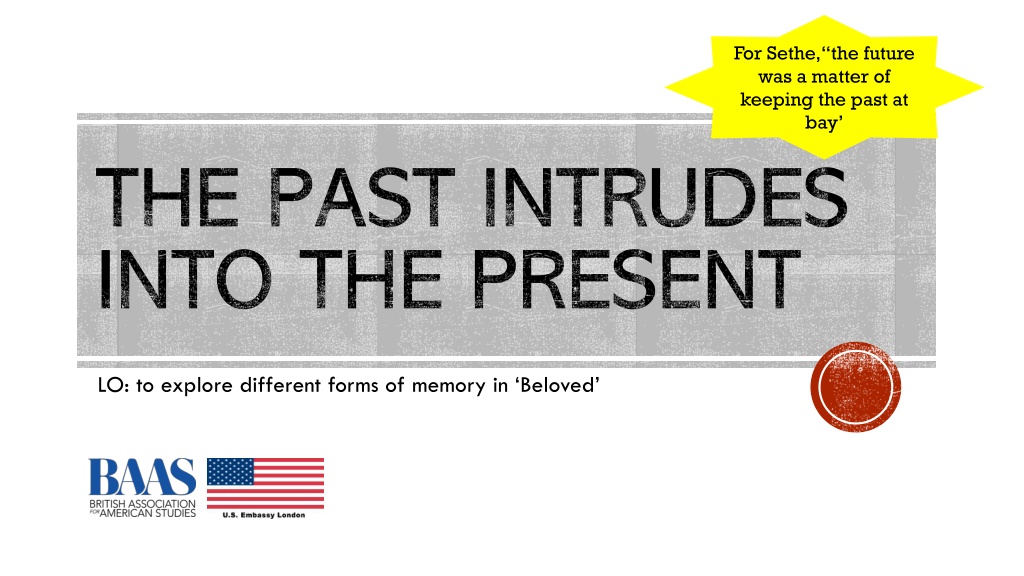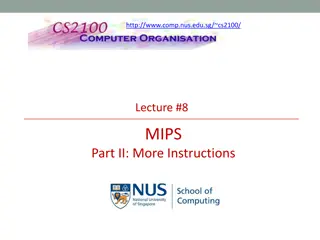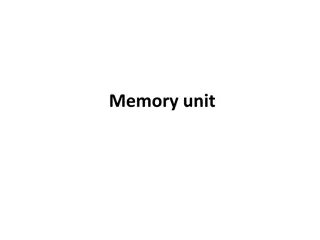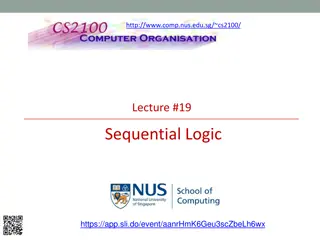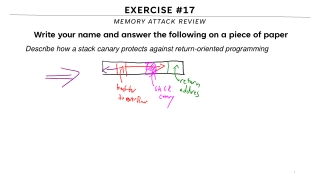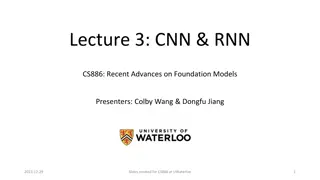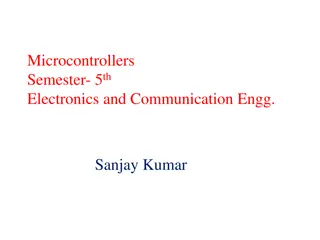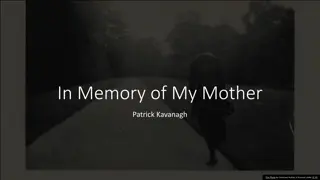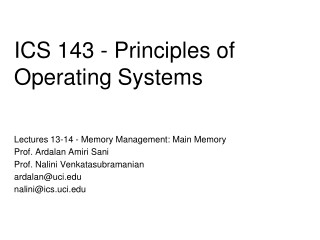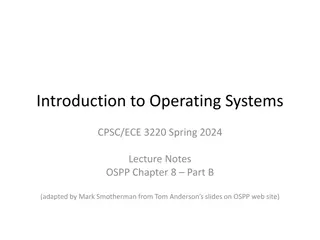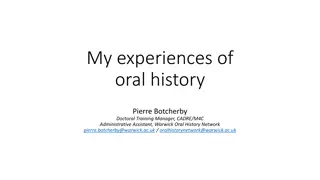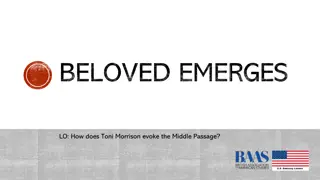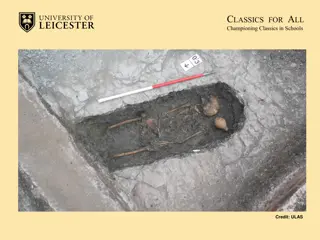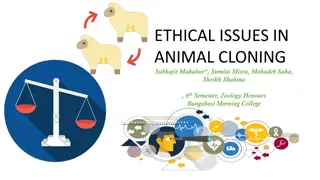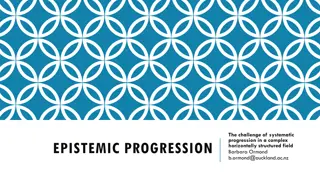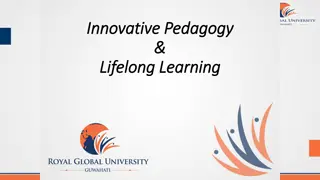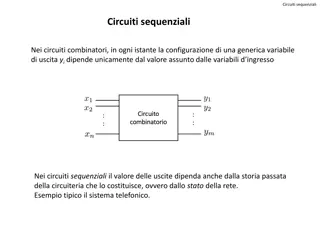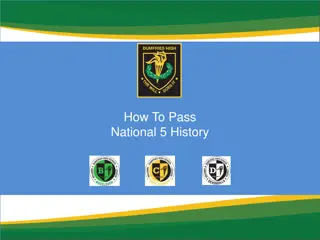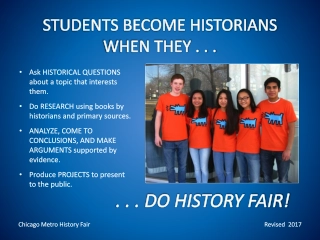Exploring Memory and History in Beloved
Delve into the intricacies of memory and history as portrayed in Beloved by examining the characters Sethe, Paul D, and Baby Suggs. Uncover the themes of slavery, trauma, and resilience through their experiences. Discover the impact of the past on the present and the struggles faced by each protagonist in a post-Civil War America. Unearth the complexities of identity and desire amidst a backdrop of historical significance.
Download Presentation
Please find below an Image/Link to download the presentation.
The content on the website is provided AS IS for your information and personal use only. It may not be sold, licensed, or shared on other websites without obtaining consent from the author. Download presentation by click this link. If you encounter any issues during the download, it is possible that the publisher has removed the file from their server.
Presentation Transcript
For Sethe,the future was a matter of keeping the past at bay THE PAST INTRUDES INTO THE PRESENT LO: to explore different forms of memory in Beloved
Objects and History: What can these artefacts tell you about the history of slavery and its different facets? Middle passage and Roots : https://youtu.be/0IJrhQE6DZk Reconstruction, in U.S. history, the period (1865 77) that followed the American Civil War and during which attempts were made to redress the inequities of slavery and its political, social, and economic legacy. Watch this video to learn more: https://www.britannica.com/event/Reconstruction- United-States-history
STARTER: MIND-MAP THE PROTAGONISTS! Inside the figure: What desires does the character have / What does the character wish for? Inside the figure: What are their main fears or traumata? Inside the figure: How would you describe their personality? Outside the figure: What is their situation and environment like? Add contextual ideas (key words: slavery, underground railroad, Margaret Garner, Middle Passage / triangle trade, abolition, fugitive slave acts) On the skin / border between inside and outside: What conflicts and struggles emerge from this?
SETHE Halle's girl--the one with iron eyes and backbone to match. [ ]A face too still for comfort; irises the same color as her skin, which, in that still face, used to make him think of a mask with mercifully punched out eyes. [ ] Even in that tiny shack, leaning so close to the fire you could smell the heat in her dress, her eyes did not pick up a flicker of light. They were like two wells into which he had trouble gazing. Even punched out they needed to be covered, lidded, marked with some sign to warn folks of what that emptiness held.
PAUL D For a man with an immobile face it was amazing how ready it was to smile, or blaze or be sorry with you. As though all you had to do was get his attention and right away he produced the feeling you were feeling. With less than a blink, his face seemed to change underneath it lay the activity.
BABY SUGGS Her past had been like her present-- intolerable and since she knew death was anything but forgetfulness, she used the little energy left her for pondering color. "Bring a little lavender in, if you got any. Pink, if you don t.
DENVER DENVER'S SECRETS were sweet. Accompanied every time by wild veronica until she discovered cologne. The first bottle was a gift, the next she stole from her mother and hid among boxwood until it froze and cracked. That was the year winter came in a hurry at suppertime and stayed eight months.
SIXO The kind of thing Sixo would do--like the time he arranged a meeting with Patsy the Thirty-Mile Woman. It took three months and two thirty-four-mile round trips to do it. To persuade her to walk one-third of the way toward him, to a place he knew. A deserted stone structure that Redmen used way back when they thought the land was theirs. Sixo discovered it on one of his night creeps, and asked its permission to enter. Inside, having felt what it felt like, he asked the Redmen's Presence if he could bring his woman there. It said yes and Sixo painstakingly instructed her how to get there,
WHOS BELOVED? The name Beloved is non the gravestone, but it s not actually the name of Sethe's daughter This word is used at funerals and weddings what does this signify? She might be The executed daughter come to life (and perhaps willed into existence by Sethe and Denver) A physical embodiment of the spiteful poltergeist and therefore a malignant presence Incarnation of Sethe's guilt and her unforgiving memory America s past of slavery and the Middle Passage
WHAT IS MEMORY? Which of these ideas about memory are most relevant to Beloved ? Why? Those who cannot remember the past are condemned to repeat it (George Santayana, 1905) Memory is the past made present (Michael Rothberg 2009) Our memory has no guarantees at all, and yet we bow more often than is objectively justified to the compulsion to believe what it says. (Sigmund Freud) On trauma: Pierre Janet (late 19thcentury) contrasted traumatic and narrative memory. Janet links traumatic memory to a bodily memory might be triggered by smells, sounds, other sensations, or might occur in nightmares, too On cultural memory: Memory is cultural: it is our symbolic heritage conveyed in texts, rites, monuments, celebrations, objects, sacred scriptures and other media that serve as mnemonic triggers (Jan Assmann) TS Eliot: Why, for all of us, out of all we have heard, seen, felt, in a lifetime, do certain images recur, charged with emotion, rather than others? The song of one bird, the leap of one fish, at a particular place and time, the scent of one flower, [ ]: such memories may have symbolic value, but of what we cannot tell, for they come to represent the depths of feeling into which we cannot peer.
HOW DOES TONI MORRISON APPROACH MEMORY? THE BLACK BOOK PREFACE I am The Black Book. Between my top and my bottom, my right and my left, I hold what I have seen, what I have done, and what I have thought. I am everything I have hated: labor without harvest; death without honor; life without land or law. I am a black woman holding a white child in her arms singing to her own baby lying unattended in the grass. I am all the ways I have failed: I am the black slave owner, the buyer of Golden Peacock Bleach Creme and Dr. Palmer s Skin Whitener, the selfhating player of the dozens; I am my own nigger joke. I am all the ways I survived: I am tun-mush, hoecake cooked on a hoe; I am Fourteen black jockeys winning the Kentucky Derby. I am the creator of hundreds of patented inventions; I am Lafitte the pirate and Marie Laveau. I am Bessie Smith winning a roller-skating contest; I am quilts and ironwork, fine carpentry and lace. I am the wars I fought, the gold I mined, the horses I broke, the trails I blazed. I am all the things I have seen: The New York Caucasian newspaper, the scarred back of Gordon the slave, the Draft Riots, darky tunes, and merchants distorting my face to sell thread, soap, shoe polish, coconut. And I am all the things I have ever loved: scuppernong wine, cool baptisms in silent water, dream books and number playing. I am the sound of my own voice singing Sangaree. I am ring-shouts, and blues, ragtime and gospels. I am mojo, voodoo, and gold earrings. I am not complete here; there is much more, but there is no more time and no more space . . . and I have journeys to take, ships to name, and crews. Toni Morrison, 1973
CULTURAL MEMORY: CONTESTED MEMORY Questions to discuss: In Beloved, Toni Morrison evokes the memory of Margaret Garner, who is a contested figure, and was at the heart of controversies surrounding slavery and emancipation. Why would she have chosen this controversial figure? What kind of cultural memories is she interested in? African American memory is often linked to oral culture / storytelling and folklore. Does this echo in Beloved, too? How does this influence Toni Morrison's style? Watch this video as an example: https://youtu.be/-L5xOMTKf2A Why is this the case? Read up on this here: https://theconversation.com/how-african-american-folklore-saved-the- cultural-memory-and-history-of-slaves-98427
SO HOW DOES TONI MORRISON PRESENT THE PAST AND MEMORY? Key Idea: For Toni Morrison, memory (the deliberate act of remembering) is a form of willed creation. It is not an effort to find out the way it really was- that is research. The point is to dwell on the way it appeared and why it appeared in that particular way Questions to ask: Reminder on Style: Reminder on Style: Authoritative or subjective? Shared or solitary? Beloved is characterised by a style that is elliptical, and time-scales that are quite elastic: elliptical, elastic: Reliable or unreliable? references are made to events or characters that are only explained later on: coherence is denied Willed or suddenly occurring? memories (of Sweet Home, Sethe s escape, etc) start here and there, so that the present is shot through with the past but they aren t developed chronologically How related to forgetting? Is remembering thinking or feeling? Also, language is open to ambivalence, multiple language is open to ambivalence, multiple meanings, and contradictory connotations meanings, and contradictory connotations:
ANNOTATE YOUR EXTRACT! Key Idea: For Toni Morrison, memory (the deliberate act of remembering) is a form of willed creation. It is not an effort to find out the way it really was- that is research. The point is to dwell on the way it appeared and why it appeared in that particular way Questions to ask: Reminder on Style: Beloved is characterised by a style that is elliptical, and time-scales that are quite elastic: references are made to events or characters that are only explained later on: coherence is denied memories (of Sweet Home, Sethe s escape, etc) start here and there, so that the present is shot through with the past but they aren t developed chronologically Also, language is open to ambivalence, multiple meanings, and contradictory connotations: Authoritative or subjective? Shared or solitary? Reliable or unreliable? Willed or suddenly occurring? How related to forgetting? Is remembering thinking or feeling?
THE PAST INTRUDES INTO THE PRESENT: EXCERPT 1, P. 4 THE PAST INTRUDES INTO THE PRESENT: EXCERPT 1, P. 4 Baby Suggs died shortly after the brothers left, with no interest whatsoever in their leave-taking or hers, and right afterward Sethe and Denver decided to end the persecution by calling forth the ghost that tried them so. Perhaps a conversation, they thought, an exchange of views or something would help. So they held hands and said, "Come on. Come on. You may as well just come on." The sideboard took a step forward but nothing else did. "Grandma Baby must be stopping it," said Denver. She was ten and still mad at Baby Suggs For dying. Sethe opened her eyes. "I doubt that," she said. "Then why don't it come?" "You forgetting how little it is," said her mother. "She wasn't even two years old when she died. Too little to understand. Too little to talk much even." "Maybe she don't want to understand," said Denver. "Maybe. But if she'd only come, I could make it clear to her." Sethe released her daughter's hand and together they pushed the sideboard back against the wall. Outside a driver whipped his horse into the gallop local people felt necessary when they passed 124. "For a baby she throws a powerful spell," said Denver. "No more powerful than the way I loved her," Sethe answered and there it was again. The welcoming cool of unchiseled headstones; the one she selected to lean against on tiptoe, her knees wide open as any grave. Pink as a fingernail it was, and sprinkled with glittering chips. Ten minutes, he said. You got ten minutes I'll do it for free.
THE PAST INTRUDES INTO THE PRESENT: EXCERPT 2, P. 6 THE PAST INTRUDES INTO THE PRESENT: EXCERPT 2, P. 6 Baby Suggs rubbed her eyebrows. "My first-born. All I can remember of her is how she loved the burned bottom of bread. Can you beat that? Eight children and that's all I remember." "That's all you let yourself remember," Sethe had told her, but she was down to one herself-- one alive, that is--the boys chased off by the dead one, and her memory of Buglar was fading fast. Howard at least had a head shape nobody could forget. As for the rest, she worked hard to remember as close to nothing as was safe. Unfortunately her brain was devious. She might be hurrying across a field, running practically, to get to the pump quickly and rinse the chamomile sap from her legs. Nothing else would be in her mind. The picture of the men coming to nurse her was as lifeless as the nerves in her back where the skin buckled like a washboard. Nor was there the faintest scent of ink or the cherry gum and oak bark from which it was made. Nothing. Just the breeze cooling her face as she rushed toward water. And then sopping the chamomile away with pump water and rags, her mind fixed on getting every last bit of sap off--on her carelessness in taking a shortcut across the field just to save a half mile, and not noticing how high the weeds had grown until the itching was all the way to her knees. Then something. The plash of water, the sight of her shoes and stockings awry on the path where she had flung them; or Here Boy lapping in the puddle near her feet, and suddenly there was Sweet Home rolling, rolling, rolling out before her eyes, and although there was not a leaf on that farm that did not make her want to scream, it rolled itself out before her in shameless beauty. It never looked as terrible as it was and it made her wonder if hell was a pretty place too. Fire and brimstone all right, but hidden in lacy groves. Boys hanging from the most beautiful sycamores in the world. It shamed her-- remembering the wonderful soughing trees rather than the boys. Try as she might to make it otherwise, the sycamores beat out the children every time and she could not forgive her memory for that.
THE PAST INTRUDES INTO THE PRESENT: EXCERPT 4, P. 19 THE PAST INTRUDES INTO THE PRESENT: EXCERPT 4, P. 19 "We was talking 'bout a tree, Sethe." "After I left you, those boys came in there and took my milk. That's what they came in there for. Held me down and took it. I told Mrs. Garner on em. She had that lump and couldn't speak but her eyes rolled out tears. Them boys found out I told on em. Schoolteacher made one open up my back, and when it closed it made a tree. It grows there still." "They used cowhide on you?" "And they took my milk." "They beat you and you was pregnant?" "And they took my milk!" The fat white circles of dough lined the pan in rows. Once more Sethe touched a wet forefinger to the stove. She opened the oven door and slid the pan of biscuits in. As she raised up from the heat she felt Paul D behind her and his hands under her breasts. She straightened up and knew, but could not feel, that his cheek was pressing into the branches of her chokecherry tree. ""What tree on your back?" "Huh." Sethe put a bowl on the table and reached under it for flour. "What tree on your back? Is something growing on your back? I don't see nothing growing on your back." "It's there all the same." "Who told you that?" "Whitegirl. That's what she called it. I've never seen it and never will. But that's what she said it looked like. A chokecherry tree. Trunk, branches, and even leaves. Tiny little chokecherry leaves. But that was eighteen years ago. Could have cherries too now for all I know. [ ]
THE PAST INTRUDES INTO THE PRESENT: EXCERPT 7, P. 35 THE PAST INTRUDES INTO THE PRESENT: EXCERPT 7, P. 35- -36 36 And it was the tender embrace of the dress sleeve that made Denver remember the details of her birth--that and the thin, whipping snow she was standing in, like the fruit of common flowers. The dress and her mother together looked like two friendly grown-up women--one (the dress) helping out the other. And the magic of her birth, its miracle in fact, testified to that friendliness as did her own name. Easily she stepped into the told story that lay before her eyes on the path she followed away from the window. There was only one door to the house and to get to it from the back you had to walk all the way around to the front of 124, past the storeroom, past the cold house, the privy, the shed, on around to the porch. And to get to the part of the story she liked best, she had to start way back: hear the birds in the thick woods, the crunch of leaves underfoot; see her mother making her way up into the hills where no houses were likely to be. How Sethe was walking on two feet meant for standing still.
THE PAST INTRUDES INTO THE PRESENT: EXCERPT 7, P. 43 THE PAST INTRUDES INTO THE PRESENT: EXCERPT 7, P. 43 "Not for anything. I don't pray anymore. I just talk." "What were you talking about?" "You won't understand, baby." "Yes, I will." "I was talking about time. It's so hard for me to believe in it. Some things go. Pass on. Some things just stay. I used to think it was my rememory. You know. Some things you forget. Other things you never do. But it's not. Places, places are still there. If a house burns down, it's gone, but the place--the picture of it--stays, and not just in my rememory, but out there, in the world. What I remember is a picture floating around out there outside my head. I mean, even if I don't think it, even if I die, the picture of what I did, or knew, or saw is still out there. Right in the place where it happened." "Can other people see it?" asked Denver. "Oh, yes. Oh, yes, yes, yes. Someday you be walking down the road and you hear something or see something going on. So clear. And you think it's you thinking it up. A thought picture. But no. It's when you bump into a rememory that belongs to somebody else. Where I was before I came here, that place is real. It's never going away. Even if the whole farm- -every tree and grass blade of it dies. The picture is still there and what's more, if you go there--you who never was there--if you go there and stand in the place where it was, it will happen again; it will be there for you, waiting for you. So, Denver, you can't never go there. Never. Because even though it's all over--over and done with--it's going to always be there waiting for you. That's how come I had to get all my children out. No matter what." Denver picked at her fingernails. "If it's still there, waiting, that must mean that nothing ever dies." Sethe looked right in Denver's face. "Nothing ever does," she said.
THE PAST INTRUDES INTO THE PRESENT: EXCERPT 10, P. 69 THE PAST INTRUDES INTO THE PRESENT: EXCERPT 10, P. 69 "Where your diamonds?" Beloved searched Sethe's face. "Diamonds? What would I be doing with diamonds?" "On your ears." "Wish I did. I had some crystal once. A present from a lady I worked for." "Tell me," said Beloved, smiling a wide happy smile. "Tell me your diamonds." It became a way to feed her. Just as Denver discovered and relied on the delightful effect sweet things had on Beloved, Sethe learned the profound satisfaction Beloved got from storytelling. It amazed Sethe (as much as it pleased Beloved) because every mention of her past life hurt. Everything in it was painful or lost. She and Baby Suggs had agreed without saying so that it was unspeakable; to Denver's inquiries Sethe gave short replies or rambling incomplete reveries. Even with Paul D, who had shared some of it and to whom she could talk with at least a measure of calm, the hurt was always there-like a tender place in the corner of her mouth that the bit left. But, as she began telling about the earrings, she found herself wanting to, liking it. Perhaps it was Beloved's distance from the events itself, or her thirst for hearing it in any case it was an unexpected pleasure. [ ]
THE PAST INTRUDES INTO THE PRESENT: EXCERPT 11, P. 73 THE PAST INTRUDES INTO THE PRESENT: EXCERPT 11, P. 73 What Nan told her she had forgotten, along with the language she told it in. The same language her ma'am spoke, and which would never come back. But the message--that was and had been there all along. Holding the damp white sheets against her chest, she was picking meaning out of a code she no longer understood. Nighttime. Nan holding her with her good arm, waving the stump of the other in the air. "Telling you. I am telling you, small girl Sethe," and she did that. She told Sethe that her mother and Nan were together from the sea. Both were taken up many times by the crew. "She threw them all away but you. The one from the crew she threw away on the island. The others from more whites she also threw away. Without names, she threw them. You she gave the name of the black man. She put her arms around him. The others she did not put her arms around. Never. Never. Telling you. I am telling you, small girl Sethe." As small girl Sethe, she was unimpressed. As grown-up woman Sethe she was angry, but not certain at what. A mighty wish for Baby Suggs broke over her like surf. In the quiet following its splash, Sethe looked at the two girls sitting by the stove: her sickly, shallow-minded boarder, her irritable, lonely daughter. They seemed little and far away. Sethe gathered hair from the comb and leaning back tossed it into the fire. It exploded into stars and the smell infuriated them. "Oh, my Jesus," she said and stood up so suddenly the comb she had parked in Denver's hair fell to the floor. "Ma'am? What's the matter with you, Ma'am?" Sethe walked over to a chair, lifted a sheet and stretched it as wide as her arms would go. Then she folded, refolded and double folded it. She took another. Neither was completely dry but the folding felt too fine to stop. She had to do something with her hands because she was remembering something she had forgotten she knew. Something privately shameful that had seeped into a slit in her mind right behind the slap on her face and the circled cross. "Why they hang your ma'am?" Denver asked. This was the first time she had heard anything about her mother's mother. Baby Suggs was the only grandmother she knew. "I never found out. It was a lot of them," she said, but what was getting clear and clearer as she folded and refolded damp laundry was the woman called Nan who took her hand and yanked her away from the pile before she could make out the mark. Nan was the one she knew best, who was around all day, who nursed babies, cooked, had one good arm and half of another. And who used different words. Words Sethe understood then but could neither recall nor repeat now. She believed that must be why she remembered so little before Sweet Home except singing and dancing and how crowded it was.
SUM IT UP! In what ways does the past intrude into the present in Beloved?
